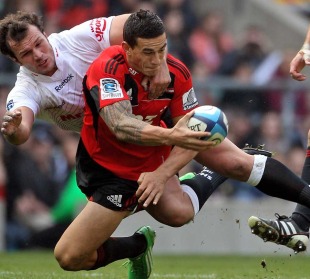|
Comment
Southern rivals not so Super
Hugh Farrelly
March 29, 2011

Sonny Bill Williams and the Crusaders produced an exhibition of free-flowing rugby at Twickeham on Saturday
© Getty Images
Enlarge
Last weekend's Super Rugby clash between the Crusaders and Sharks, featuring a host of New Zealand and South African internationals, was a bit of an eye-opener with the Rugby World Cup in mind - not least for Ireland. A typically try-laden (nine in all) scoreline of 44-28 was perfect for sponsors and broadcasters desperate to provide an easy-on-the-eye product to win over happy-clappy supporters. The attack-at-all-costs policy by both sides exposed deficiencies in their respective defences but also showcased a skill level and tempo that, based on recent Six Nations evidence, looks beyond the scope of their northern hemisphere rivals. With New Zealand 2011 now a mere five months away, there is not enough time to adopt the southern 'Super' way but that is not necessarily a bad thing for Ireland. Super Rugby is not 'Cup' rugby. Indeed, it could not seem further removed from the tense, tetchy contests that dominate the World Cup, when fear of making fatal mistakes tends to dilute ambition. The game is constantly evolving but history throws up trends that seem to hold true in any era and one of them is that pragmatists prosper at World Cups, particularly in the professional era. South Africa ground their way to the title in 2007, when they beat an English side that appeared to be in disarray but made the final through a combination of scrum, stoicism and sensible rugby. Ireland went in as the all-singing, all-dancing 'golden generation' and flopped. In 2003, England largely smothered their flair on their way to the title and trusted in their experience and self-belief while, in 1999, Australia won the worst World Cup of them all through intractable defence. And that is the starting point for Ireland. After a Six Nations that fluctuated between some enthralling attacking rugby and infuriating self-destruction, the most encouraging aspect from an Irish point of view was their defensive surety under the guidance of Les Kiss. The Australian oversaw a campaign that yielded a miserly four tries - only one of which could be put down squarely to poor defence. The first try they conceded against Italy could have been better defended but the fact Declan Kidney's side were down to 14 men gave the Italians the extra space to get over in the corner. The Welsh try scored by Mike Phillips at the Millennium Stadium should not have been allowed, as has been well documented, and Steve Thompson's consolation score for England was something of a 'freak' score as the veteran hooker read Eoin Reddan's flat pass to David Wallace and had the gas to finish it off. Only the second try against France could be attributed fully to weak defence as Gordon D'Arcy was bounced on a front-up tackle by Aurelien Rougerie which created the opportunity for Maxime Medard to touch down. It was a bad miss but an untypical one for the Leinster centre, who was one of Ireland's best defenders over the course of the five games.
The off-loading skills that the New Zealanders, Australians and South Africans bring to the table present a different challenge to that encountered in the Six Nations but Kiss will be studying Super Rugby and the Tri-Nations in microscopic detail and he will have a plan. A key aspect will be slowing down possession. The Irish will seek to hold up the attacker, preferably by double teaming him, and turn the tackle into a maul or at least delay the quick ruck ball that creates the mismatches further out. Second-row Donncha O'Callaghan is the flag-bearer in this regard and his return of 60 tackles in the championship was phenomenal. Being hard to break down is the starting point for Ireland. Add in the improvement in their scrum and kick-off receptions, which hurt them badly in November, and the foundations are firmly in place. The discipline problems that derailed Kidney's best intentions earlier in the Championship were also eradicated as the tournament wore on, culminating in the concession of just six penalties against England. When they win penalties, Ireland have place-kickers of the calibre of Jonathan Sexton and Ronan O'Gara to turn it into points, while they also showed their willingness and capability when it comes to securing five-pointers. Put it all together and you have a pretty exciting package. The worry is that Ireland saved their best performance for the emotion-laden clash with England at Lansdowne Road, which had added spice for the home team as there was a Grand Slam party to spoil. Did it require that particular opposition and scenario to bring the best out of this Ireland side or can they replicate that focus, tempo and execution against every side? Only time will tell. But, if Ireland can successfully use that exhilarating victory over England as the template for their World Cup campaign, they really are in business - regardless of how 'Super' their opponents are. © ESPN Sports Media Ltd.
| |||||||||||||||
Live Sports
Communication error please reload the page.
-
Football
-
Cricket
-
Rugby
-
- Days
- Hrs
- Mins
- Secs
F1 - Abu Dhabi GP
Abu Dhabi Grand Prix December 11-131. Max Verstappen ()
2. Valtteri Bottas (Mercedes)
3. Lewis Hamilton (Mercedes)
4. Alexander Albon ()
5. Lando Norris ()
6. Carlos Sainz Jr ()
-
ESPNOtherLive >>
Boxing - Nelson v Wilson; Simmons v Dickinson; Joshua v Gavern (Metro Radio Arena, Newcastle)
Golf - Houston Open
Snooker - China Open
Tennis - Miami Open

